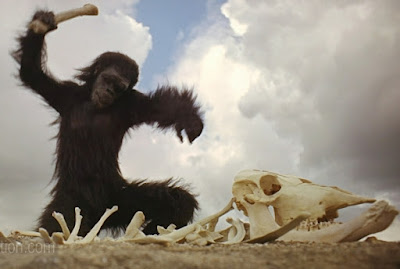Chimps & Macaques Enter the Stone Age.
In the rainforests of West Africa, the woodlands of Brazil and the beaches of Thailand, archaeologists have unearthed some truly remarkable stone tools. It's not the workmanship that makes them special. If anything, a casual observer might struggle to even identify them as ancient tools.
What makes these tools noteworthy is that the hands that held them weren't human. These stone tools were wielded by chimpanzees, capuchins and macaques. The sites where they have been unearthed are the basis of a brand new field of science: primate archaeology.
The tools are crude. A chimpanzee or monkey stone hammer is hardly a work of art to rival the beauty of an ancient human hand axe. But that's not the point. These primates have developed a culture that makes routine use of a stone-based technology. That means they have entered the Stone Age.
Chimpanzees of West Africa do seem to have managed to pass their stone-based technology… which they use to crack open nuts… down many generations. We know this because of a landmark study in primate archaeology that was published in 2007.
 Chimpanzees are our closest living relative. The fact that they, like us, can use stone tools might imply that the common ancestor of chimpanzees and humans was the first to develop a stone based technology.
Chimpanzees are our closest living relative. The fact that they, like us, can use stone tools might imply that the common ancestor of chimpanzees and humans was the first to develop a stone based technology.
It's possible that chimpanzees… and macaques and capuchins… haven't yet reached the limits of their technological capabilities. But it's not clear whether they will have the opportunity to advance their Stone Age technology. We are shrinking their populations dramatically through habitat destruction and hunting. Smaller populations cannot spread and sustain complex technologies as well as larger groups.
In other words, chimps and monkeys might have the capacity to make much more sophisticated stone tools, but they may never get the chance to achieve that potential: all because of another group of primates that became master stone tool manufacturers.
The above excerpts were taken from the work presented by Colin Barras, for the British Broadcasting Corporation. Full Article here.







Comments